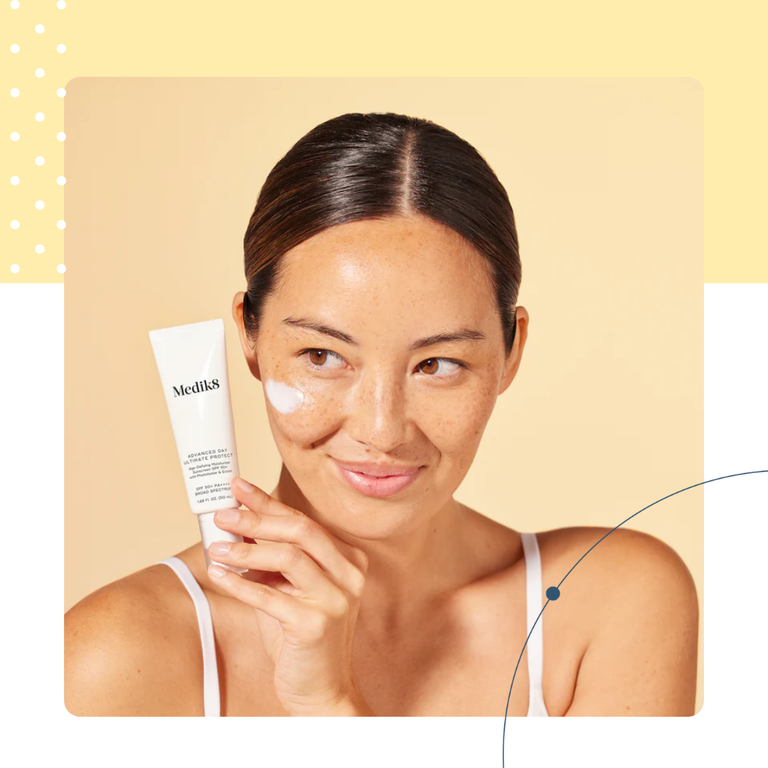Choosing between skincare ingredients can be tricky at the best of times—but it’s even trickier when they do similar things. AHAs and BHAs both exfoliate the skin, leaving behind a clearer, brighter and younger-looking complexion. But which one should you choose? And do you even have to choose? We’re here to help answer those exact questions.
At Face Dr, our team of skin experts have decades of experience in the industry. We’ve helped hundreds of clients get the glowing skin they dream of—all by using the best ingredients for them.
Want to skip the research and find out if you should be using AHAs or BHAs in your routine right away? We offer free online skincare consultations where you can get tailored advice from an expert. From the comfort of your home—and in just 30 minutes—one of our skin experts can analyse your skin over a video call and then recommend whether you should be using AHAs, BHAs or a different ingredient altogether to tackle your concerns.
Ready to dive into what sets AHAs and BHAs apart? Here’s what we’ll cover.
- What’s the difference between AHAs and BHAs
- What do AHAs and BHAs do for the skin
- How to choose between AHAs and BHAs
- AHAs vs BHAs by skincare concern
- Can you use AHAs and BHAs together
- Products with AHAs and BHAs to try
Want to learn more about other skincare ingredients? We’ve covered lactic acid, glycolic acid and mandelic acid in detail, all of which are different types of AHAs.

What’s the difference between AHAs and BHAs
AHAs (alpha hydroxy acids) and BHAs (beta hydroxy acids) are both powerful chemical exfoliants that help remove dead skin cells and improve overall skin texture. While they share similar benefits, they work in slightly different ways and target different skin concerns.
AHAs — such as glycolic acid, lactic acid, citric acid, and mandelic acid — are water-soluble acids. They work on the surface of the skin, breaking down the bonds between dead skin cells to reveal a smoother, brighter complexion. AHAs are ideal for dry, dull, or sun-damaged skin, helping to boost collagen production and improve skin firmness over time.
BHAs, like salicylic acid, beta-hydroxybutyric acid, trethocanic acid, and tropic acid, are oil-soluble. This means they can penetrate deeper into the pores to dissolve excess oil, unclog pores, and reduce acne and breakouts. BHAs are best suited for oily or blemish-prone skin, helping to reduce shine and minimise the appearance of enlarged pores.
In short:
- AHAs exfoliate the skin’s surface, improving tone and texture.
- BHAs go deeper, clearing congestion and controlling oil.
- Both acids can promote clearer, smoother, and more youthful-looking skin when used correctly.
What do AHAs and BHAs do for the skin?
Both AHAs (alpha hydroxy acids) and BHAs (beta hydroxy acids) are chemical exfoliants that help resurface the skin and improve its overall condition. While they share many of the same benefits, each acid type also offers unique advantages depending on your skin type and concerns.
Both AHAs and BHAs can:
-
Brighten dull skin and reduce hyperpigmentation
-
Help clear acne and breakouts
-
Smooth fine lines and wrinkles
-
Improve overall skin texture and radiance
-
Minimise the appearance of pores
AHAs can:
-
Even out skin tone for a more balanced, radiant complexion
-
Stimulate collagen production for firmer, plumper skin
BHAs can:
-
Penetrate deep into pores to reduce oiliness and shine
-
Help prevent clogged pores and future breakouts
How to choose between AHAs and BHAs
Want these benefits for yourself? As AHAs and BHAs have many of the same benefits, it can sometimes come down to preference. Maybe you’ve found a salicylic acid product you like the texture of, or your skin reacts best to lactic acid. Looking to target a particular concern? Here’s our guide on how to choose.

AHAs vs BHAs by skincare concern
AHAs vs BHAs for ageing
Both AHAs and BHAs can help to reduce the signs of ageing, but if this is your main concern, AHAs may do a better job. AHAs can not only lighten age spots and brighten the overall complexion for a more youthful glow, but they can also boost collagen to plump the skin and smooth lines and wrinkles.
Discover skincare for ageing skin
AHAs vs BHAs for acne
While AHAs can be beneficial for those with acne, BHAs are the way to go if you’re suffering from acne and breakouts as your main concern. That’s because BHAs not only exfoliate dead skin cells from the surface of your skin, but they also go into the deeper layers to work there at clearing out pores. Plus, BHAs can actually impact the amount of oil your skin produces, a key contributor to acne.
AHAs vs BHAs for hyperpigmentation
Both AHAs and BHAs can help with hyperpigmentation, but AHAs are seen as the go-to for this. That’s because they do a better job at exfoliating the top layer of dead skin cells, which are often where the discolouration lies. If your skin can tolerate it, glycolic acid does a great job at exfoliating the skin to brighten hyperpigmentation.
Discover skincare for pigmentation
AHAS vs BHAs for oily skin
People with oily skin will see benefits from using both AHAs and BHAs, but if oilliness is your main concern, BHAs are the way to go. They can not only target acne and breakouts, but actually impact the amount of oil your skin is producing, leading to less shiny patches and oil buildup over time.
Discover skincare for oily skin
AHAs vs BHAS for dry and sensitive skin
Some people with dry skin find AHAs too drying. However, BHAs are known to be less irritating, drying and less likely to cause redness. They can even help to calm sensitive skin. Therefore, if you have very dry skin or are prone to sensitivity—or you’ve had reactions to AHAs in the past—you could try BHAs to get a lot of the same benefits.
Alternatively, you may find that some AHAs work for you while others are too irritating. Glycolic acid is the most drying and potentially irritating AHA, so if you can opt for more gentle AHAs like lactic acid and mandelic acid, if you have dry or sensitive skin.
Discover skincare for sensitive skin
Face Dr top tip: Just because you find an ingredient drying or irritating doesn’t mean you necessarily have to stop using it all altogether. Some people find that using an AHA or BHA every day is too irritating, but using it just a few times a week is fine for their skin. Often, a small reaction will even pass once the skin has been exfoliated. Worried about reactions? Reach out to an expert who can advise you on the best way to bring AHAs and BHAs into your routine if you’re new to the ingredients.
AHAS vs BHAs for combination skin
If you have combination skin, you’re probably better off going for a BHA that can tackle oiliness in your shiny areas. If this isn’t a huge problem for you, you can focus on other concerns—like ageing, acne and hyperpigmentation—and go for either AHAs or BHAs depending on which concerns you want to tackle.
Discover skincare for combination skin
Can you use AHAs and BHAs together?
The short answer is yes! You can use AHAs and BHAs together to maximise the benefits for your skin. However, while some people can use both ingredients and not see any irritation from it, others may need to be careful they’re not over-exfoliating.
You can alternate AHAs and BHAs in your routine. For example, you could use an AHA on one night and a BHA the next night. Or you can look for products which combine both as the ingredients have then been formulated in the right percentages to be used at the same time.
Face Dr top pick: ZO Oil Control Pads — formulated with both AHAs and BHAs, these pre-soaked pads can target everything from acne to ageing.
Products with AHAs and BHAs to try

Want to add AHAs and BHAs to your routine? Here are our favourite products to try:
- Medik8 Clarifying Foam — a gentle foaming cleanser designed for congested and blemish-prone skin. Enriched with AHAs and BHAs, it provides mild exfoliation to clear pores, remove impurities, and help reduce breakouts.
- Medik8 Press & Clear — a lightweight tonic, powered by 2% BHA with salicylic acid, polylysine, and tranexamic acid, helps treat blemishes, prevent breakouts, and support sensitive skin.
- ZO Oil Control Pads — get the benefits of both AHAs and BHAs with these easy-to-use pre-soaked pads. Ideal for targeting excess oil, acne and breakouts.
- ZO Exfoliating Cleanser — add BHAs to your routine with this cleanser to exfoliate your way to a clearer, younger and brighter complexion.
-
ZO Skin Health Exfoliation Accelerator — using two types of AHAs (glycolic and lactic acid), this serum is great to brighten the complexion, targeting everything from ageing to dark spots.
Want to speak to an expert?

Still not sure whether to choose AHAs or BHAs? The best way to know you’re making the right choice for your skin is by speaking with an expert. At Face Dr, we offer free online consultations where you can do exactly that.
On a 30-minute video call, one of our experts can analyse your skin and ask about your concerns—like acne, ageing, hyperpigmentation, or simply taking the best care of your skin. With all this information, they’ll be able to tell you whether AHAs or BHAs are better for the job. They can then recommend products you should add to your routine with the best AHAs or BHAs for you. Plus, if there’s a better ingredient out there—like Matrixyl 3000, bakuchiol or ceramides—they can recommend that and the best products to try.
When it comes to product recommendations, we only ever share products and brands that we know and trust. This way, you can be sure you’re investing in skincare that will actually deliver results.








